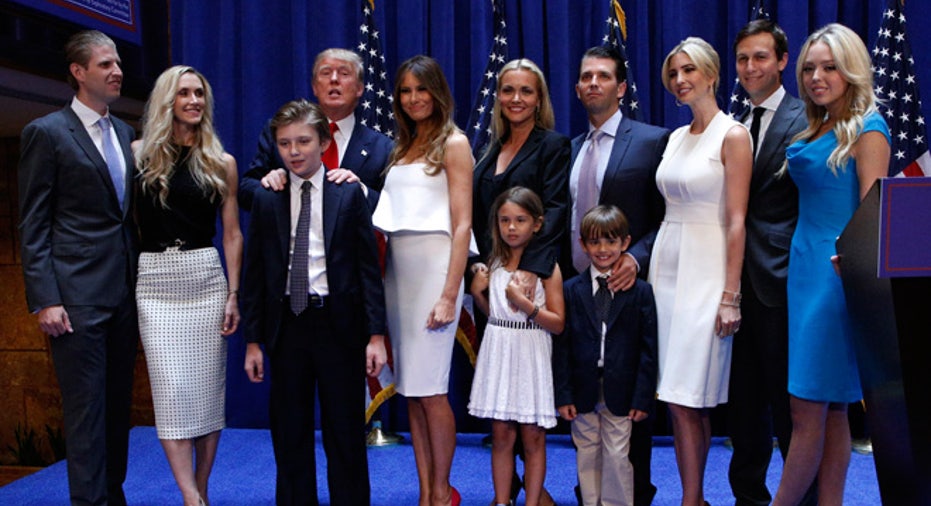What is a Blind Trust? And Why It May Be Donald Trump's Best Option

President Lyndon Johnson had one. So did President Ronald Reagan and President Jimmy Carter. It’s a blind trust and several Presidents have used them while in office to ease concerns about conflicts of interest. President-elect Donald Trump is now considering whether to use one as well, according to reports. On Monday he tweeted that his sons and unamed executives will run his business but offered few details. He also postponed an event that was set for Thursday to discuss the plan for his empire.
I will hold a press conference in the near future to discuss the business, Cabinet picks and all other topics of interest. Busy times!
— Donald J. Trump (@realDonaldTrump) December 13, 2016
Even though I am not mandated by law to do so, I will be leaving my busineses before January 20th so that I can focus full time on the......
— Donald J. Trump (@realDonaldTrump) December 13, 2016
Presidency. Two of my children, Don and Eric, plus executives, will manage them. No new deals will be done during my term(s) in office.
— Donald J. Trump (@realDonaldTrump) December 13, 2016
Some critics have called on Trump to sell off his businesses entirely in order to eliminate the appearance of any conflicts of interest. It may sound reasonable but selling off all of his assets, especially his real estate holdings, could take several years and it could cost him a fortune in taxes. Another option could be to gift his businesses to his children but that may result in a steep tax bill too. If the children wanted to buy the businesses from their father, they will likely need a large amount of liquidity. Trump could just turn over management to his children but the businesses would remain in the ownership of the family, not doing much to ease concerns about potential conflicts of interest.
While there is no simple answer to satisfy everyone, a blind trust may be Trump’s easiest solution according to Eric Schaefer, a financial advisor at Evermay Wealth Management. “The blind trust means, Donald Trump has no control,” Schaefer says. “He doesn’t know what’s going on in the underlying management.”
Blind Trusts
Blind trusts are not widely used. A person, usually in public office, will set up a blind trust and typically have an independent trustee oversee business interests in order to avoid any conflicts of interest. He or she retains ownership but is unaware of how assets are managed. President Lyndon Johnson set up a blind trust while in office so he and his wife could keep their television station in Texas. President Jimmy Carter placed his peanut farm in a blind trust to avoid the appearance of any conflicts of interest while he was President. “They set it up for a specific amount of time and once they leave office and once there are no critics to answer to, they simply dissolve the trust and take everything back out of it,” Schaefer says.
But for Donald Trump, who owns well-known real estate holdings including Trump Tower and Trump Hotels, setting up a blind trust in the traditional sense may be unrealistic. "It would be fairly hard to have a real blind trust because if a trustee were to sell any assets, the sale would likely be above the radar screen so he would probably know and that defeats it being blind which is you don't really know what you own," says Bruce Steiner, an attorney with Kleinberg Kaplan who specializes in business succession planning and trust administration. If Trump also names his children as trustees, they would not be considered independent.
Steiner says redefining how a traditional blind trust works and having it more loosely-defined may be a possibility for Trump. He also points out President-elect Trump is exempt from the conflict of interest law and is not required under the law to set up any sort of blind trust. “Presidents are not bound by this so he doesn’t have to do anything,” Steiner says.
Unchartered Territory
Steiner adds this is unchartered territory for the country. Trump will be the wealthiest President in U.S. history. Never before has a President in the U.S. had a multi-billion dollar fortune and stakes in hundreds of businesses around the world, leaving open the possibility for conflicts of interest. “The President is not subject to these rules. Presumably Congress thought the President would do what he/she thought was the best for the country. Presidents do want to go down in history well and they care about their legacy. They, by and large, try to do a good job,” Steiner says.
Schaefer says finding a solution to mitigate conflict of interest concerns will likely be a daunting task given the size and scope of all of Trump’s business assets and partnerships. “His attorneys have a really challenging couple of months ahead of them because understanding how various different tax entities and legal entities work, it is going to be challenging,” Schaefer says.



















